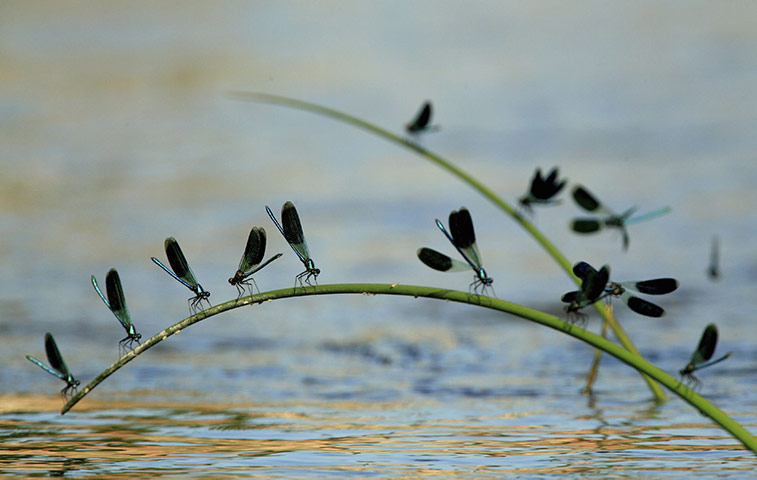TOP STORIES
Birds affected by Awakino oil spill
Up to 20 birds have been coated with oil after a major spill which clogged a King Country river on Wednesday.
More than 20,000 litres of oil spilled into the Awakino River when an oil tanker overturned and its contents flowed down the river to the mouth, about 98km northeast of New Plymouth.
Waikato Regional Council said in a statement up to 20 shags, terns and ducks in the coastal marine area had been lightly oiled.
The News Zealand Herald - www.nzherald.co.nz
24 Jun 2011
24 Jun 2011
Location: Awakino Gorge, News Zealand - Map It 

Experts Pin Kent Lake Fish Die-Off on Virus
A new estimate of 200 to 500 carp died, likely due to a virus called spring viremia of carp, said DNR fisheries biologist, Jim Francis.
Francis said that conditions were favorable for the spread of the virus, with the lake’s temperature being under 65 degrees.
...Other area lakes have been affected by the same virus, including Woodland Lake in Brighton.
...Though 500 fish sounds like a big number, Francis said it only represents a small percent of the population in Kent Lake. He says the die-off is likely over now that the lake’s temperature is just above 65 degrees.
Scientists Uncover an Unhealthy Herds Hypothesis
 Biologists worldwide subscribe to the healthy herds hypothesis, the idea that predators can keep packs of prey healthy by removing the weak and the sick. This reduces the chance disease will wipe out the whole herd, but could it be that predators can also make prey populations more susceptible to other predators or even parasites? Biologists at the Georgia Institute of Technology have discovered at least one animal whose defenses against a predator make it a good target for one opportunistic parasite.
Biologists worldwide subscribe to the healthy herds hypothesis, the idea that predators can keep packs of prey healthy by removing the weak and the sick. This reduces the chance disease will wipe out the whole herd, but could it be that predators can also make prey populations more susceptible to other predators or even parasites? Biologists at the Georgia Institute of Technology have discovered at least one animal whose defenses against a predator make it a good target for one opportunistic parasite.... "We found that strategies that prey use to defend themselves against predators can increase their susceptibility to infection by parasites," said Meghan Duffy, assistant professor in Georgia Tech's School of Biology.
Science Daily - www.sciencedaily.com
24 Jun 2011
Cited Journal Article
MA Duffy et al. Unhealthy herds: indirect effects of predators enhance two drivers of disease spread. Functional Ecology, 2011; DOI: 10.1111/j.1365-2435.2011.01872.x
MA Duffy et al. Unhealthy herds: indirect effects of predators enhance two drivers of disease spread. Functional Ecology, 2011; DOI: 10.1111/j.1365-2435.2011.01872.x
Migratory birds play a key role in global spreading of tick-borne disease
The most common tick-borne disease in humans is Lyme borreliosis. Extensive field and laboratory tests have revealed that the Borrelia bacterium is present in a larger proportion of ticks than has been shown by earlier studies. Another finding is that migratory birds play an important role in the spreading of ticks and pathogenic agents borne by ticks.
Ticks are to be found in most parts of the world, and more than 900 species have been identified so far. The geographic distribution of these many tick species varies and the most prevalent species in Norway is the forest tick (Ixodes ricinus), which can be the bearer of a number of bacteria and viruses that can infect animals and humans and cause disease.
News Medical - www.news-medical.net
24 Jun 2011
24 Jun 2011
OTHER WILDLIFE HEALTH RELATED NEWS
Photo courtesy of The Guardian, Week in Wildlife
 Silent, Tick-Borne Disease on the Rise [babesiosis]
Silent, Tick-Borne Disease on the Rise [babesiosis]- More than 70 penguins are found dead on the coast of Rio Grande do Sul [Brazil - Map It
 ] [translation disclaimer]
] [translation disclaimer] - Flooding takes a toll on wildlife [Lincoln County, Nebraska, USA]
- Danger heats up for Australia's platypus [climate change]
- Officials gain little insight into what killed 22 pelicans at Washoe Lake
- Scat-Sniffing Dogs Nose Out Clues to Caribou Decline
- What is Killing the Bats? [Smithsonian Magazine]
- Bat count to help combat killer disease [Pennsylvania, USA]
- Scientists Call on Congress for More Research Funding for Bat-killing Disease,Stress Importance of Cave Closures [Center for Biological Diversity press release]
- Another Sacramento-area bird suspected of carrying West Nile Virus found dead [California, USA - Map It
 ]
] - Crow with West Nile virus found in Hartford [California, USA - Map It
 ]
]




